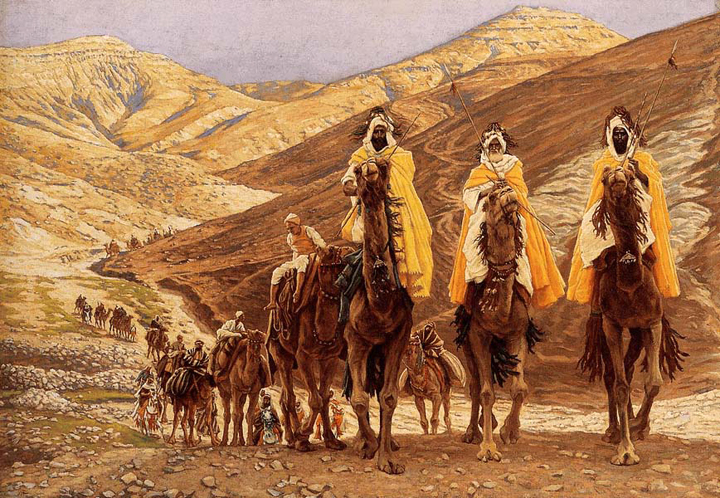
Journey of the Magi
James Tissot, 1894
My dear friends,
In his poem Journey of the Magi, T.S. Eliot transports us back in time to the journey of the Magi, those wise men who embarked on a quest in search of the divine, as told in Matthew 2:1-12. Through their narrative, we glimpse the arduous voyage undertaken by these seekers of truth, guided only by the distant star that beckoned them towards a revelation.
Likewise, in our own lives, we embark on an inward journey — a journey of self-discovery, purpose, and enlightenment. Just as the Magi encountered obstacles and trials along their path, so too do we face challenges that test our resolve and commitment to the spiritual path. The true essence of spirituality lies not in the absence of difficulties but in the way we navigate through them with grace, compassion, and resilience.
In these verses of poem and Gospel, let us reflect on three key themes that resonate deeply with universal truths that bind us all: the yearning for transformation, the disillusionment with worldly pursuits, and the significance of surrender.
- First, the yearning for transformation. The Magi, driven by an inner longing, embarked on a perilous pilgrimage to find the divine child, a symbolic representation of a profound shift in consciousness. In our own lives, we too possess an innate yearning for transformation—a yearning to transcend the limitations of ego and material desires, and to awaken to our highest potential. The seeds of transformation are nurtured through introspection, meditation, and a sincere desire to cultivate inner virtues such as compassion, love, and wisdom.
- Next, the disillusionment with worldly pursuits. The Magi, upon reaching their destination, encountered a scene that challenged their preconceived notions and expectations. They witnessed the birth of a savior in humble circumstances, devoid of earthly grandeur. This realization led them to question the very foundations upon which they had built their lives, and to realize the futility of chasing worldly achievements and the transient nature of material possessions. We too need to shift our focus from external accumulations to inner qualities, for it is in cultivating virtues and fostering connections with others that we find true fulfillment and lasting joy.
- Finally, the significance of surrender. In the poem, the Magi recount their transformative experience, expressing a sense of loss and displacement upon returning to their former lives. They recognize that the journey they embarked upon had irrevocably changed them, and they can never go back to the way things were. For us, too, surrendering our self-centered attachments and expectations is a vital step on the path to enlightenment. It is in letting go of our limited sense of self that we open ourselves to boundless possibilities of wisdom and compassion.
As we contemplate the profound insights embedded within this story, let us remember that the quest for truth and spiritual awakening is a universal endeavor that transcends religious boundaries. Let us embrace the teachings that resonate with our hearts, for it is through compassion, wisdom, and unity that we can bring about positive change in ourselves and the world around us.
May this Epiphany inspire us to embark on our own inner pilgrimage to seek the light of truth. May we, like the Magi, find the courage to let go of that which no longer serves us, and to surrender to the transformative power of love, compassion, and wisdom.